'Discovering Korean Cinema' Talk and Q&A at the Korean Cultural Centre UK:
The Hangul Celluloid overview of subjects discussed at the event:
On Tuesday 23rd November, around sixty people gathered at the Korean Cultural Centre UK for a series of talks, encompassed by the title 'Discovering Korean Cinema', held to celebrate the success of the 2010 London Korean Film Festival and to launch an accompanying booklet. Dr. Daniel Martin, Dr. Jinhee Choi and Dr. Mark Morris gave short lectures on various aspects of Korean cinema, and its relevance to UK audiences, followed by a question and answer session.
There follows a brief rundown of the topics discussed in each lecture:
Dr. Daniel Martin:
Dr. Daniel Martin started proceedings with a lecture discussing 'Korean Cinema and the British Audience: Five Years of the London Korean Film Festival'.
Detailing the emergence of Korean film releases in the UK, Dr. Martin began by discussing the main accomplishments of the London Korean Film Festival since its launch in 2006, leading into an overview of the process by which Korean cinema gradually became a force to be reckoned with in the UK market.
Examples of events which were pivotal to that success - including 'Nowhere To Hide' (1999) being the first Korean film to receive a nationwide theatrical release (into a market which was virtually unaware of Korean films, and the resultant comparisons made at the time to more familiar Hong Kong films); the subsequent release of "extreme" titles on Tartan's 'Asia Extreme' label and the immense success of Oldboy (2004), which combined to, at least partly, give UK audiences the perception the Korean cinema was inherently violent; and the launching of the London Korean Film Festival - with its aims to dispel this preconception and bring a large range of films, ranging from mainstream works, to independent productions and even animations, to British audiences.
Dr. Martin concluded with a look at the hoped expansion of the festival in forthcoming years, and then handed over to Dr. Jinhee Choi.
Dr. Jinhee Choi:
Dr. Jinhee Choi's talk ('From National Heroes to Local Hoodlums: South Korean Gangster Cinema') dealt with the gangster film genre from the 70's to the present day, comparing and contrasting the overall style of earlier to later films and the influence of other countries' films on the Korean gangster film, noting that, even when Japanese films were banned in South Korea subsequent to South Korean independence, they still had a huge influence on the style seen in South Korean gangster films at the time.
Dr. Choi also commented on the many and varied sub-genres contained within the overall genre - from high school-youth films to gangster comedies, as well as gangster cinema "proper". Several short film clips were included in Dr. Choi's talk (including a small segment from Im Kown-taek's 'The General's Son (1990) - based on the true story of Kim Du-han - and the opening scene from 'A Bittersweet Life' (2005), directed by Kim Jee-woon).
Dr. Mark Morris:
The evening's talks were concluded by Dr. Mark Morris' discussion of Korean war films, detailing the difficulty faced by filmmakers in Korea in covering subject matter connected to the Korean War - a war that never had a definitive 'end' (just look at the news this week).
Mention was made of several films, including Korean War comedy 'Welcome to Dongmakgol' (2005), and short clips were shown from several early Korean war films, including Lee Kang-cheol's 'Piagol' and Lee Man-hee's 'The Marines Who Never Returned' (1963).
The subsequent Q&A saw further discussion of the subjects covered in each of the talks, and the evening drew to a close with a reception to launch the aforementioned booklet, complete with food and a chance to chat to the lecturers, and other audience members, in a more informal setting.
Posted 26th November 2010
Discovering Korean Cinema Symposium at the Korean Cultural Centre UK:
To celebrate the success of the 2010 London Korean Film Festival, on Tuesday 23rd Nov at 6pm the Korean Cultural Centre UK is to host a symposium to discuss Korean Cinema and it's importance. The event will also mark the launch of the Discovering Korean Cinema booklet featuring articles by some of the top Korean cinema educators working in the field today. These lecturers will also be on hand to discuss and expand on the topics covered in the booklet such as the effect and portrayal of the Korean War in film and the role of Korean blockbusters in the world marketplace. Some of the contributors will be attending to further discuss the topics raised in the publication.
For further information (including booking details) see: http://koreanfilm.co.uk/discovering-korean-cinema
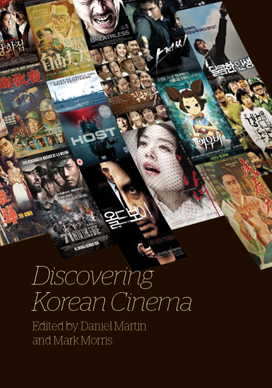 |
 |
London Korean Film Festival Opening Gala/Man From Nowhere European Premiere and Director Q&A:
And so, the 5th London Korean Film Festival has begun with an Opening Gala, including the European Premiere of The Man From Nowhere (2010 Directed by Lee Jeong-beom) - a fast paced and exciting thriller and story of redemption - all held at Odeon West End.
On arriving at the venue, I was pleasantly surprised to see a full premiere set-up complete with Red Carpet (the first ever East Asian film to get the "Red Carpet" treatment in the UK) and barriers lined with crowds of onlookers.
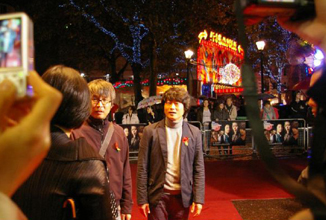 |
Assuming that the main premiere entrance was for celebrity use only (for example, Jonathan Ross and Simon Field - producer of Uncle Boonmee - were attending), I tried to get entrance by the smaller side door, but was told that I had to use the Red Carpet by a member of staff with a cheery "You've got a ticket, so the Red Carpet's for you... Indulge yourself."
Doing so was a rather strange experience, especially considering that I was attending the event on my own, have never walked the Red Carpet before, and the fact that a group of revelers behind the barrier insisted on cheering every time anyone entered the venue. Surreal.
Once in the cinema, a throng of ticket holders could be seen filling the foyer and, before long, we all filed into Screen 1.
As with last year's festival, each seat had a "goody bag" - consisting of a Festival brochure, Korean Cultural Centre event schedule and some colourful Korean rice cakes - and once the audience had all taken their places, the lead-up to the screening got underway:
A short film started proceedings, featuring best wishes from a variety of Korean film directors, actors and actresses, followed by a brief introduction hosted by Tony Rayns. Tony was called in as a last minute replacement to the original scheduled host and, it must be said, it showed - both in his pre-screening chat and the director Q&A following the film screening. A few words from the Korean ambassador, and also from the producer and director of The Man From Nowhere, concluded this first stage and the film screening itself got underway.
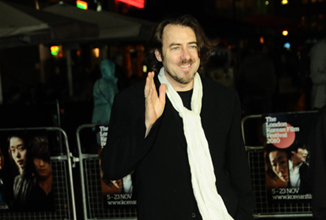 |
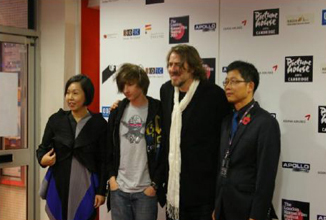 |
Though the film was extremely well received by the audience, the subsequent Q&A was a rather uncomfortable affair - I imagine for both the audience and director alike. Tony Rayns seemed almost reticent to take control of proceedings and after a short discussion of the filmmaker’s background, the Korean film industry, the casting of Won Bin, and the astronomical success of The Man From Nowhere, he quickly passed the questioning over to the audience.
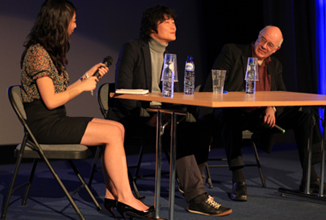 |
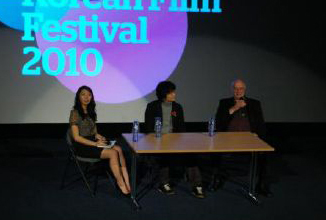 |
However, even though The Man From Nowhere is Lee Jeong-beom's second feature film, his earlier work is largely unknown and unavailable and, as such, very few audience members felt inclined to speak up. Following just a few more very general questions, the Q&A concluded but, whereas last year's Gala at the BFI had an area where more informal discussions could take place, Odeon West End has no such facilities, leaving audience members with the choice of either standing in the foyer or moving outside the cinema. Most simply went their separate ways.
Pictures are the copyright of The London Korean Film Festival.
One-on-one Interview with director Kim Ji-woon, 'I Saw The Devil' screening plus Director Q&A:
The second day of my festival attendance began at the Korean Cultural Centre in the West End with a one-on-one interview with Korean film director Kim Ji-woon.
It must be said that I was rather nervous about the whole thing and feared that I wouldn't have enough questions to fill the allotted time.
I shouldn't have worried: Kim Ji-woon was wonderfully talkative, open and friendly, and in the end I overran my time slot by a good fifteen minutes before the event organiser appeared and politely suggested that we wrap things up.
You can read a transcription of Hangul Celluloid's one-on-one interview with Kim Ji-woon in the Interviews section of this page (see the link towards the top of the page) or by clicking here
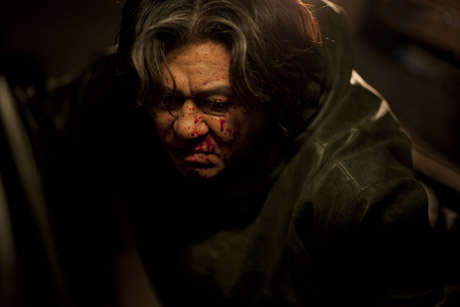 |
The screening of Kim Ji-woon's latest film, 'I Saw The Devil' (the uncensored version) - a brutal hardgore revenge thriller - was, once again held at Odeon West End and, following a brief introduction, and a few words from Kim Ji-woon himself, the film got underway.
A Q&A session with the director followed the screening which was a much more polished affair than the previous day's Q&A - with topics discussed including the film's themes; the controversy and rumours which have surrounded the film since its initial submission for rating classification; and the fine line between humour and horror within films.
Once the microphone was passed over to the audience for their questions, a veritable queue waited their turn, right up until the point when time was eventually called on proceedings.
All in all, a hugely enjoyable and successful day.
I would like to sincerely thank the Korean Cultural Centre and The London Korean Film Festival for giving the opportunity to interview director Kim Ji-woon.
The remainder of my attendances at the 2010 London Korean Film Festival consisted of various screenings at the ICA, with the whole festival experience rounded off in style (on Sunday 14th November) with a one-on-one interview with film director Im Sang-soo.
A transcription of Hangul Celluloid's one-on-one interview with Im Sang-soo can be found in the Interviews section of this page (see the link towards the top of the page) or by clicking here
The festival moves to the Arts Picturehouse Cambridge, from 15th - 23rd November, and to the QFT Belfast, from 19th - 21st November. See the screening schedule (click the "Schedule" link at the top of this page) for full screening details. |


